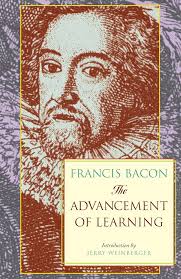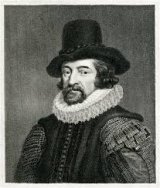The Advancement of Learning Page #20
The Advancement of Learning, published by Francis Bacon in 1605, is a foundational text in the history of science and philosophy. In this work, Bacon advocates for empirical research and the systematic organization of knowledge, laying the groundwork for the scientific method. The book critiques existing scholarly practices and proposes a new approach to learning based on observation and experimentation. It marks a significant shift towards modern scientific inquiry.
- Year:
- 1605
- 1,169 Views
Submitted by acronimous on August 11, 2024
Modified by acronimous on August 11, 2024
relied, and which faileth not: Justificata est sapientia a filiis suis. THE SECOND BOOK. To the King. 1. IT might seem to have more convenience, though it come often otherwise to pass (excellent King), that those which are fruitful in their generations, and have in themselves the foresight of immortality in their descendants, should likewise be more careful of the good estate of future times, unto which they know they must transmit and commend over their dearest pledges. Queen Elizabeth was a sojourner in the world in respect of her unmarried life, and was a blessing to her own times; and yet so as the impression of her good government, besides her happy memory, is not without some effect which doth survive her. But to your Majesty, whom God hath already blessed with so much royal issue, worthy to continue and represent you for ever, and whose youthful and fruitful bed doth yet promise many the like renovations, it is proper and agreeable to be conversant not only in the transitory parts of good government, but in those acts also which are in their nature permanent and perpetual. Amongst the which (if affection do not transport me) there is not any more worthy than the further endowment of the world with sound and fruitful knowledge. For why should a few received authors stand up like Hercules’ columns, beyond which there should be no sailing or discovering, since we have so bright and benign a star as your Majesty to conduct and prosper us? To return therefore where we left, it remaineth to consider of what kind those acts are which have been undertaken and performed by kings and others for the increase and advancement of learning, wherein I purpose to speak actively, without digressing or dilating. 2. Let this ground therefore be laid, that all works are over common by amplitude of reward, by soundness of direction, and by the conjunction of labours. The first multiplieth endeavour, the second preventeth error, and the third supplieth the frailty of man. But the principal of these is direction, for claudus in via antevertit cursorem extra viam; and Solomon excellently setteth it down, “If the iron be not sharp, it requireth more strength, but wisdom is that which prevaileth,” signifying that the invention or election of the mean is more effectual than any enforcement or accumulation of endeavours. This I am induced to speak, for that (not derogating from the noble intention of any that have been deservers towards the state of learning), I do observe nevertheless that their works and acts are rather matters of magnificence and memory than of progression and proficience, and tend rather to augment the mass of learning in the multitude of learned men than to rectify or raise the sciences themselves. 3. The works or acts of merit towards learning are conversant about three objects—the places of learning, the books of learning, and the persons of the learned. For as water, whether it be the dew of heaven or the springs of the earth, doth scatter and leese itself in the ground, except it be collected into some receptacle where it may by union comfort and sustain itself; and for that cause the industry of man hath made and framed springheads, conduits, cisterns, and pools, which men have accustomed likewise to beautify and adorn with accomplishments of magnificence and state, as well as of use and necessity; so this excellent liquor of knowledge, whether it descend from divine inspiration, or spring from human sense, would soon perish and vanish to oblivion, if it were not preserved in books, traditions, conferences, and places appointed, as universities, colleges, and schools, for the receipt and comforting of the same. 4. The works which concern the seats and places of learning are four—foundations and buildings, endowments with revenues, endowments with franchises and privileges, institutions and ordinances for government—all tending to quietness and privateness of life, and discharge of cares and troubles; much like the stations which Virgil prescribeth for the hiving of bees: “Principio sedes apibus statioque petenda, Quo neque sit ventis aditus, &c.” 5. The works touching books are two—first, libraries, which are as the shrines where all the relics of the ancient saints, full of true virtue, and that without delusion or imposture, are preserved and reposed; secondly, new editions of authors, with more correct impressions, more faithful translations, more profitable glosses, more diligent annotations, and the like. 6. The works pertaining to the persons of learned men (besides the advancement and countenancing of them in general) are two—the reward and designation of readers in sciences already extant and invented; and the reward and designation of writers and inquirers concerning any parts of learning not sufficiently laboured and prosecuted. 7. These are summarily the works and acts wherein the merits of many excellent princes and other worthy personages, have been conversant. As for any particular commemorations, I call to mind what Cicero said when he gave general thanks, Difficile non aliquem, ingratum quenquam præterire. Let us rather, according to the Scriptures, look unto that part of the race which is before us, than look back to that which is already attained. 8. First, therefore, amongst so many great foundations of colleges in Europe, I find strange that they are all dedicated to professions, and none left free to arts and sciences at large. For if men judge that learning should be referred to action, they judge well; but in this they fall into the error described in the ancient fable, in which the other parts of the body did suppose the stomach had been idle, because it neither performed the office of motion, as the limbs do, nor of sense, as the head doth; but yet notwithstanding it is the stomach that digesteth and distributeth to all the rest. So if any man think philosophy and universality to be idle studies, he doth not consider that all professions are from thence served and supplied. And this I take to be a great cause that hath hindered the progression of learning, because these fundamental knowledges have been studied but in passage. For if you will have a tree bear more fruit than it hath used to do, it is not anything you can do to the boughs, but it is the stirring of the earth and putting new mould about thee roots that must work it. Neither is it to be forgotten, that this dedicating of foundations and dotations to professory learning hath not only had a malign aspect and influence upon the growth of sciences, but hath also been prejudicial to states, and governments. For hence it proceedeth that princes find a solitude in regard of able men to serve them in causes of estate, because there is no
Translation
Translate and read this book in other languages:
Select another language:
- - Select -
- 简体中文 (Chinese - Simplified)
- 繁體中文 (Chinese - Traditional)
- Español (Spanish)
- Esperanto (Esperanto)
- 日本語 (Japanese)
- Português (Portuguese)
- Deutsch (German)
- العربية (Arabic)
- Français (French)
- Русский (Russian)
- ಕನ್ನಡ (Kannada)
- 한국어 (Korean)
- עברית (Hebrew)
- Gaeilge (Irish)
- Українська (Ukrainian)
- اردو (Urdu)
- Magyar (Hungarian)
- मानक हिन्दी (Hindi)
- Indonesia (Indonesian)
- Italiano (Italian)
- தமிழ் (Tamil)
- Türkçe (Turkish)
- తెలుగు (Telugu)
- ภาษาไทย (Thai)
- Tiếng Việt (Vietnamese)
- Čeština (Czech)
- Polski (Polish)
- Bahasa Indonesia (Indonesian)
- Românește (Romanian)
- Nederlands (Dutch)
- Ελληνικά (Greek)
- Latinum (Latin)
- Svenska (Swedish)
- Dansk (Danish)
- Suomi (Finnish)
- فارسی (Persian)
- ייִדיש (Yiddish)
- հայերեն (Armenian)
- Norsk (Norwegian)
- English (English)
Citation
Use the citation below to add this book to your bibliography:
Style:MLAChicagoAPA
"The Advancement of Learning Books." Literature.com. STANDS4 LLC, 2025. Web. 9 Mar. 2025. <https://www.literature.com/book/the_advancement_of_learning_3165>.








Discuss this The Advancement of Learning book with the community:
Report Comment
We're doing our best to make sure our content is useful, accurate and safe.
If by any chance you spot an inappropriate comment while navigating through our website please use this form to let us know, and we'll take care of it shortly.
Attachment
You need to be logged in to favorite.
Log In